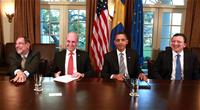An attempt to restart Transatlantic relations
Adelina Marini, November 4, 2009
 With e declaration to restart the transatlantic relations ended the first official EU-USA summit since president Obama took office, in spite that the topic was climate change. The president of the European Council - the Swedish prime minister Fredrik Reinfeldt together with the president of the European Commission Jose Manuel Barroso and the High representative of the EU for foreign policy and security Javier Solana went to Washington on Monday to discuss with president Obama the decision of the EU that the developing countries will need 100 bn euro to fight climate change.
With e declaration to restart the transatlantic relations ended the first official EU-USA summit since president Obama took office, in spite that the topic was climate change. The president of the European Council - the Swedish prime minister Fredrik Reinfeldt together with the president of the European Commission Jose Manuel Barroso and the High representative of the EU for foreign policy and security Javier Solana went to Washington on Monday to discuss with president Obama the decision of the EU that the developing countries will need 100 bn euro to fight climate change.
The EU leaders also went to the American capital to present their new Plan for Action in Afghanistan. But instead, the summit ended with a 15-page declaration which makes a thorough review of all transatlantic initiatives and common actions. There are also some new moments in the document.
On the most important and urgent topic - climate change, there was no specific result beside the political declaration that there definitely must be an agreement in Copenhagen. One of the reasons for the lack of concrete US commitments is the fact the the draft cap-and-trade legislation is still being discussed in the Senate and, for now, there is no indication that the draft will be approved before the summit in the Danish capital which starts on the 7th of December.
And with regard to Afghanistan, the American president praised the efforts of the Eu to continue its active role there. But it was not clear whether Washington filed a request for more active participation of Europe in Afghanistan and Pakistan, where the US is experiencing serious difficulties.
In the final declaration there is something new - the establishment of a mutual EU-US Energy  Council on a ministerial level which will start work yet today. The purpose of the new structure would be to improve energy security and contribute to achieving our ambitious climate change goals. A main task of the Council will be to study diversification of energy sources, such as through increased use of liquefied natural gas (LNG), solar power, wind power and biofuels, and the use of nuclear power. It will discuss how to effectively promote global energy security on the basis of transparent, stable and non-discriminatory global energy markets and diversified energy sources.
Council on a ministerial level which will start work yet today. The purpose of the new structure would be to improve energy security and contribute to achieving our ambitious climate change goals. A main task of the Council will be to study diversification of energy sources, such as through increased use of liquefied natural gas (LNG), solar power, wind power and biofuels, and the use of nuclear power. It will discuss how to effectively promote global energy security on the basis of transparent, stable and non-discriminatory global energy markets and diversified energy sources.
The declaration pays attention to absolutely all other issues in the transatlantic agenda like: Western Balkans, East European and Caucasus countries, the relations with Iran, the Middle East peace process, fight with poverty, the Doha Round of negotiations to abolish agriculture subsidies, the non-proliferation and even more.
And although the declaration is nothing more than a political statement of good will, indeed it is a very important signal toward the international community because it says that the Eu and the US (especially the US) will not approach any of the above mentioned issues unilaterally. Something that was quite common for the administration of president George W. Bush. This is confirmed by one of the first lines in the declaration: "Our goal is to ensure a more prosperous, healthy and secure future for our 800 million citizens, and for the world."
 With a very good timing was also the news that while the negotiations were taking place in Washington, the Czech president Vaclav Klaus signed the Lisbon Treaty after the Constitutional court ruled that it is not in breach with the basic laws of the country. This forced president Obama to praise the EU because of the expectation that this would make the communication with the 27-members' Union much easier and quicker, thus making the decisions more effective.
With a very good timing was also the news that while the negotiations were taking place in Washington, the Czech president Vaclav Klaus signed the Lisbon Treaty after the Constitutional court ruled that it is not in breach with the basic laws of the country. This forced president Obama to praise the EU because of the expectation that this would make the communication with the 27-members' Union much easier and quicker, thus making the decisions more effective.